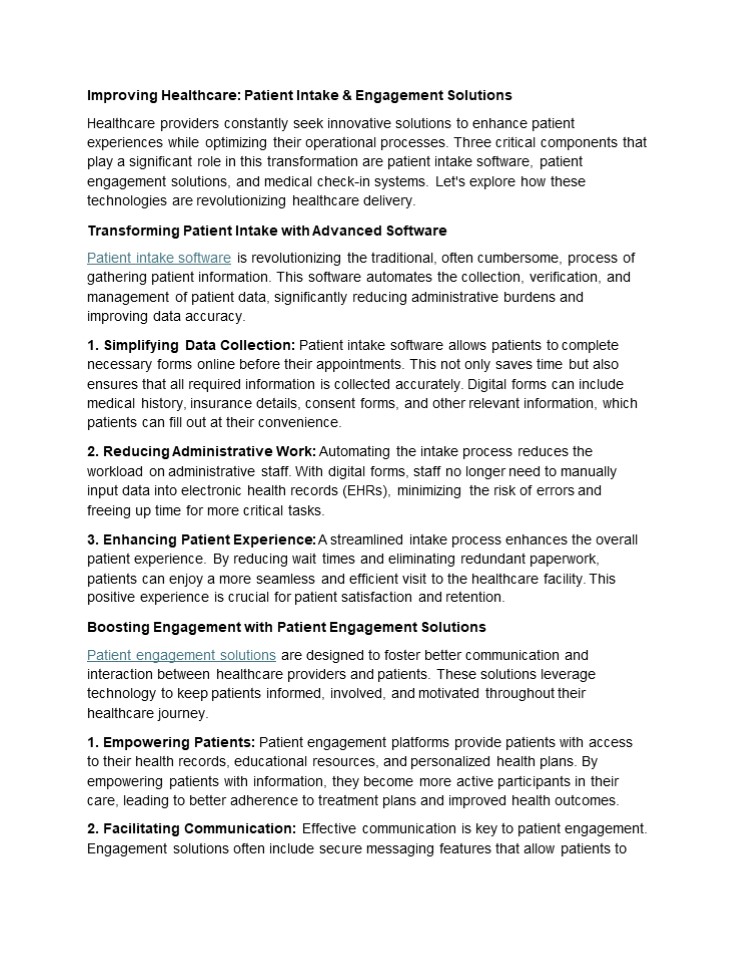Improving Healthcare: Patient Intake & Engagement Solutions - PowerPoint PPT Presentation
Title:
Improving Healthcare: Patient Intake & Engagement Solutions
Description:
Incorporating patient intake software, patient engagement solutions, and innovative medical check-in systems into healthcare practices can profoundly impact the efficiency and effectiveness of care delivery. These technologies streamline operations and enhance patient satisfaction and engagement, leading to better health outcomes. – PowerPoint PPT presentation
Number of Views:1
Title: Improving Healthcare: Patient Intake & Engagement Solutions
1
- Improving Healthcare Patient Intake Engagement
Solutions - Healthcare providers constantly seek innovative
solutions to enhance patient experiences while
optimizing their operational processes. Three
critical components that play a significant role
in this transformation are patient intake
software, patient engagement solutions, and
medical check-in systems. Let's explore how these
technologies are revolutionizing healthcare
delivery. - Transforming Patient Intake with Advanced
Software - Patient intake software is revolutionizing the
traditional, often cumbersome, process of
gathering patient information. This software
automates the collection, verification, and
management of patient data, significantly
reducing administrative burdens and improving
data accuracy. - Simplifying Data Collection Patient intake
software allows patients to complete necessary
forms online before their appointments. This not
only saves time but also ensures that all
required information is collected accurately.
Digital forms can include medical history,
insurance details, consent forms, and other
relevant information, which patients can fill out
at their convenience. - Reducing Administrative Work Automating the
intake process reduces the workload on
administrative staff. With digital forms, staff
no longer need to manually input data into
electronic health records (EHRs), minimizing the
risk of errors and freeing up time for more
critical tasks. - Enhancing Patient Experience A streamlined
intake process enhances the overall patient
experience. By reducing wait times and
eliminating redundant paperwork, patients can
enjoy a more seamless and efficient visit to the
healthcare facility. This positive experience is
crucial for patient satisfaction and retention. - Boosting Engagement with Patient Engagement
Solutions - Patient engagement solutions are designed to
foster better communication and interaction
between healthcare providers and patients. These
solutions leverage technology to keep patients
informed, involved, and motivated throughout
their healthcare journey. - Empowering Patients Patient engagement platforms
provide patients with access to their health
records, educational resources, and personalized
health plans. By empowering patients with
information, they become more active participants
in their care, leading to better adherence to
treatment plans and improved health outcomes. - Facilitating Communication Effective
communication is key to patient engagement.
Engagement solutions often include secure
messaging features that allow patients to
2
- communicate with their healthcare providers
easily. Whether it's a question about a
prescription or a follow-up on treatment, timely
communication helps address patient concerns and
fosters trust. - 3. Personalizing Care These solutions can
analyze patient data to provide personalized
recommendations and reminders. For instance,
patients might receive reminders for medication,
upcoming appointments, or preventive screenings
based on their health history and current
conditions. Personalized care enhances patient - satisfaction and encourages proactive health
management. - Innovating Medical Check-In Processes
- The medical check-in process is the first point
of interaction between patients and healthcare
providers. Streamlining this process with
technology can significantly improve patient flow
and overall efficiency. - Implementing Self-Service Kiosks Medical
check-in kiosks allow patients to check in for
their appointments quickly and easily. These
self-service kiosks can verify patient
information, update records, and process co-pays,
reducing the need for manual intervention by
staff. This speeds up the check-in process and
minimizes wait times. - Enhancing Data Accuracy Kiosks and digital
check-in systems ensure that the information
entered by patients is directly integrated into
the EHR system. This reduces the risk of errors
associated with manual data entry and ensures
that healthcare providers have access to accurate
and up-to-date information. - Improving Operational Efficiency By automating
the check-in process, healthcare facilities can
optimize patient flow and reduce bottlenecks.
This not only enhances the patient experience but
also allows healthcare providers to see more
patients in a day, improving the facility's
overall efficiency and revenue. - Integrating Technologies for Comprehensive Care
- The integration of patient intake software,
patient engagement solutions, and advanced
medical check-in systems creates a comprehensive
approach to healthcare management. These
technologies work together to streamline
operations, improve patient experiences, and
enhance overall care delivery. - Seamless Data Flow When these systems are
integrated, data flows seamlessly from patient
intake to engagement and check-in processes. This
ensures that healthcare providers have a holistic
view of the patient's health, enabling more
informed decision-making and better-coordinated
care. - Enhancing Patient Satisfaction A seamless,
technology-driven experience from the moment a
patient enters the healthcare facility to their
follow-up care significantly
3
enhances patient satisfaction. Reduced wait
times, personalized care, and efficient
communication contribute to a positive patient
experience. 3. Optimizing Resources By reducing
administrative burdens and streamlining
processes, healthcare facilities can optimize
their resources. This allows staff to focus more
on patient care rather than administrative tasks,
improving the overall quality of care
provided. Conclusion Incorporating patient intake
software, patient engagement solutions, and
innovative medical check-in systems into
healthcare practices can profoundly impact the
efficiency and effectiveness of care delivery.
These technologies not only streamline operations
but also enhance patient satisfaction and
engagement, leading to better health outcomes.































